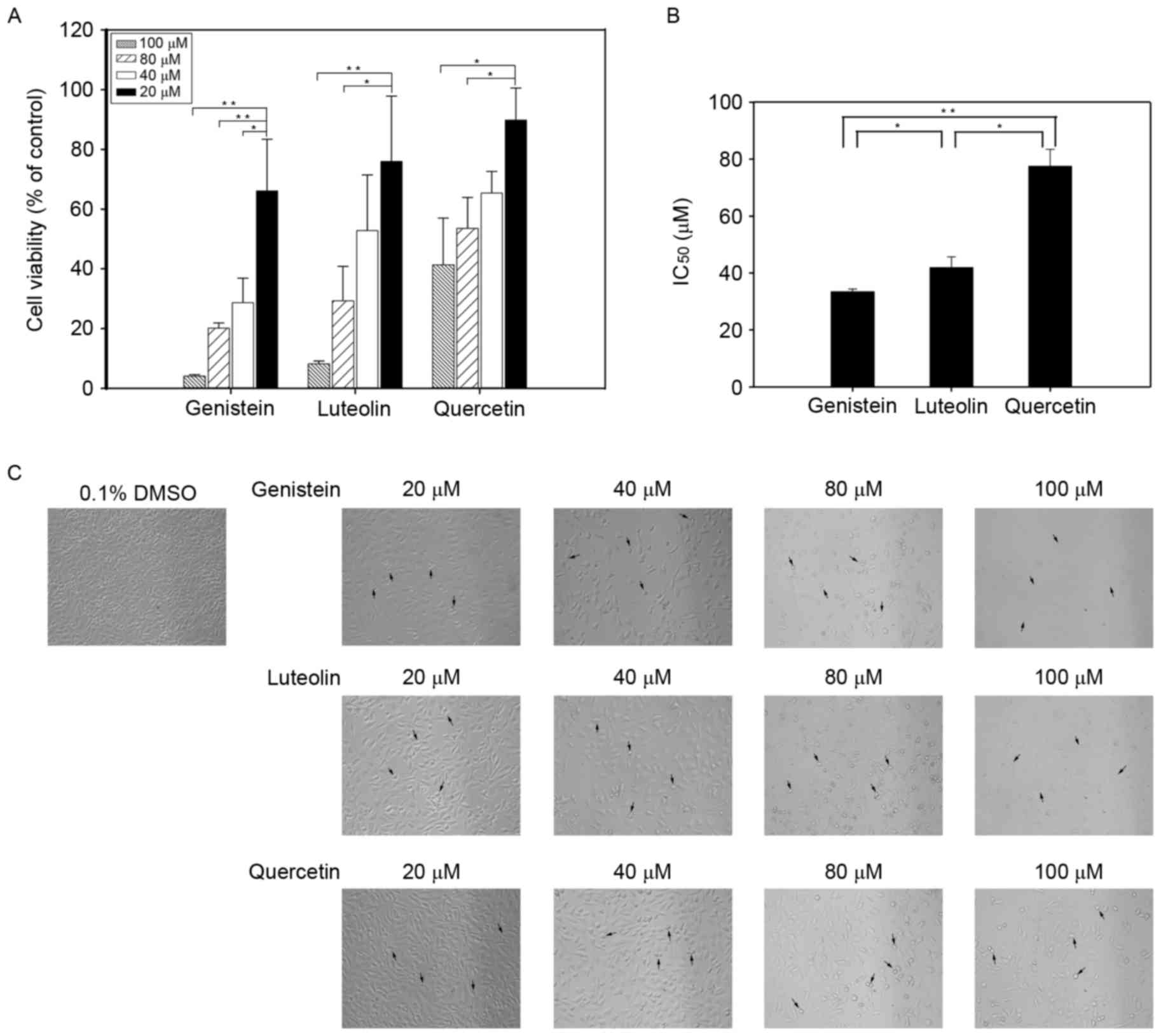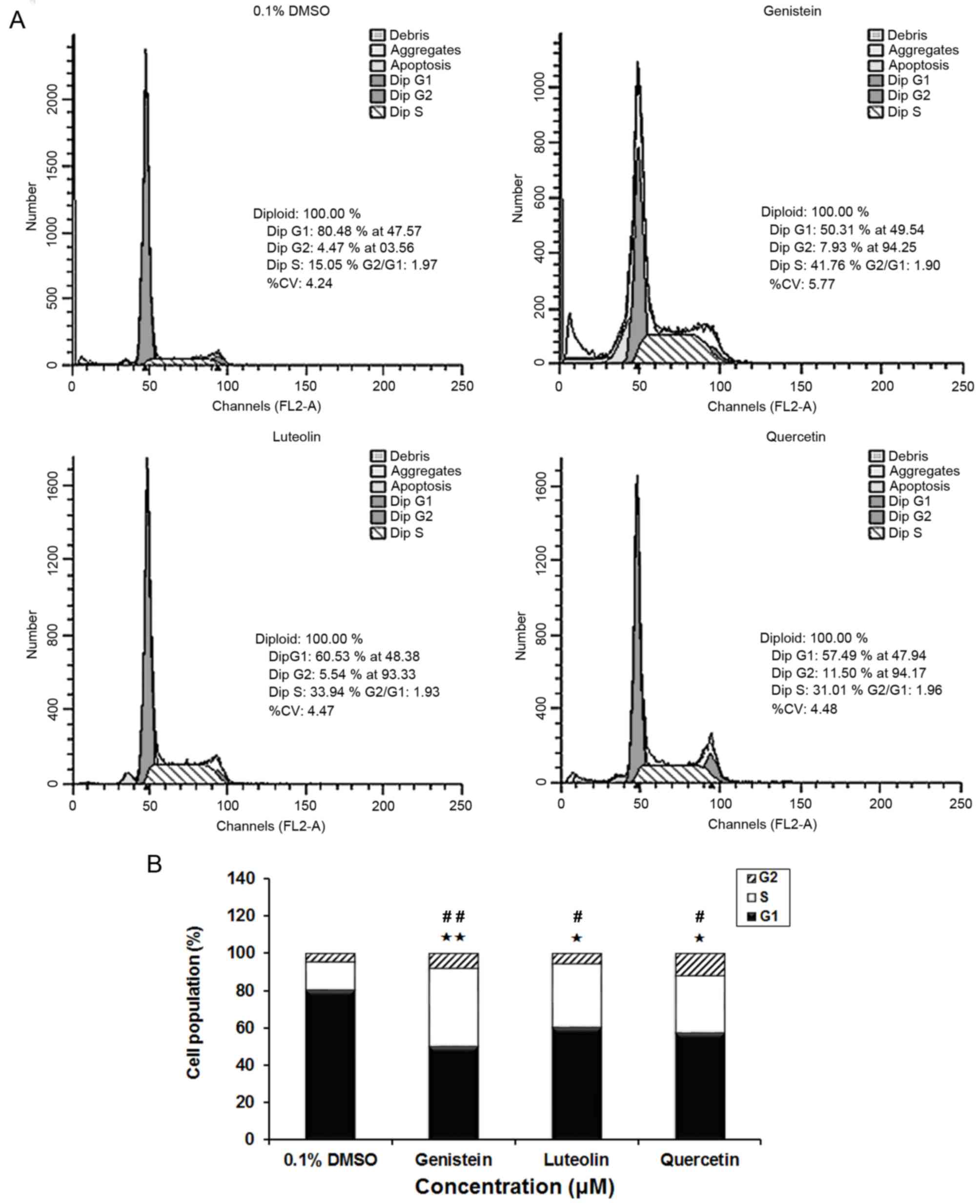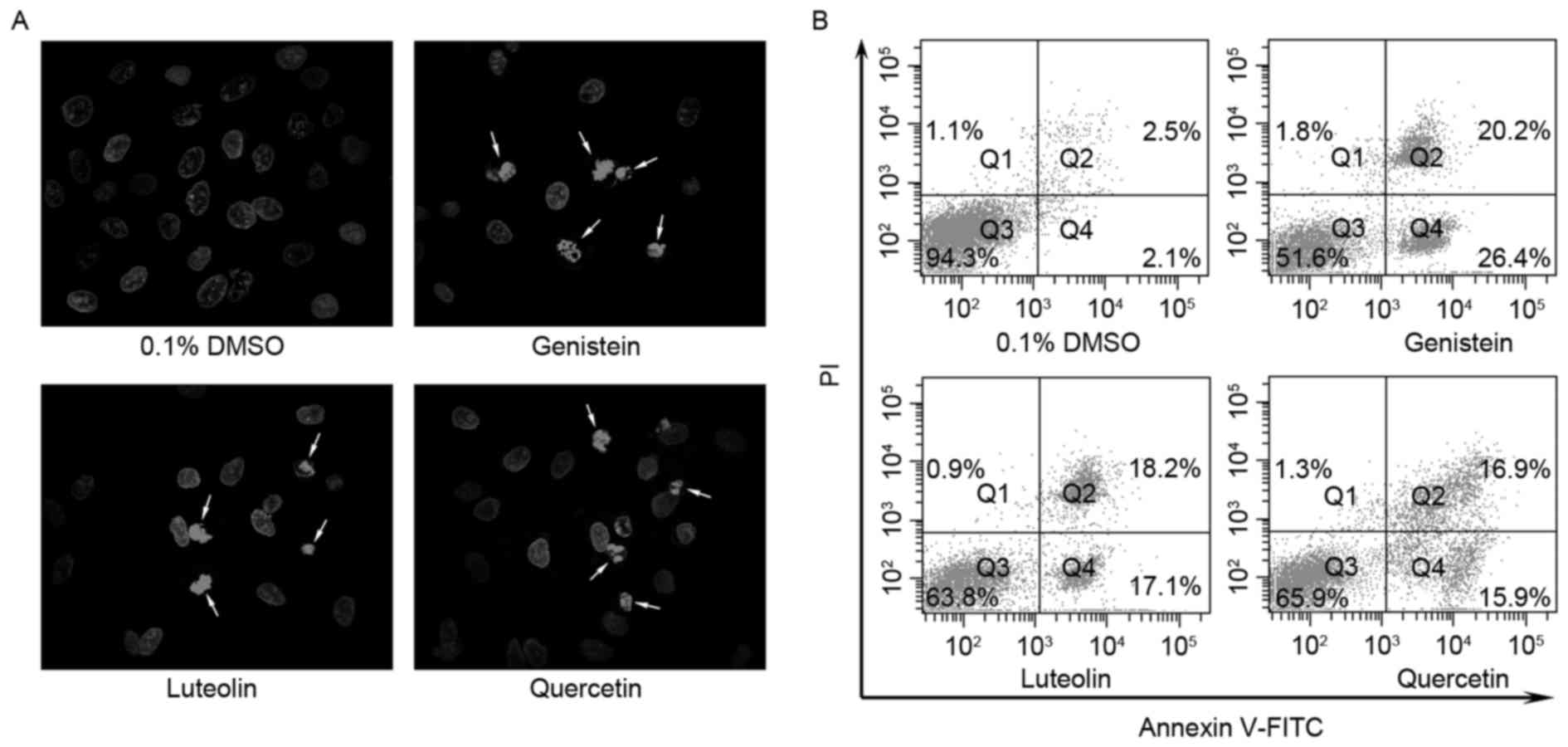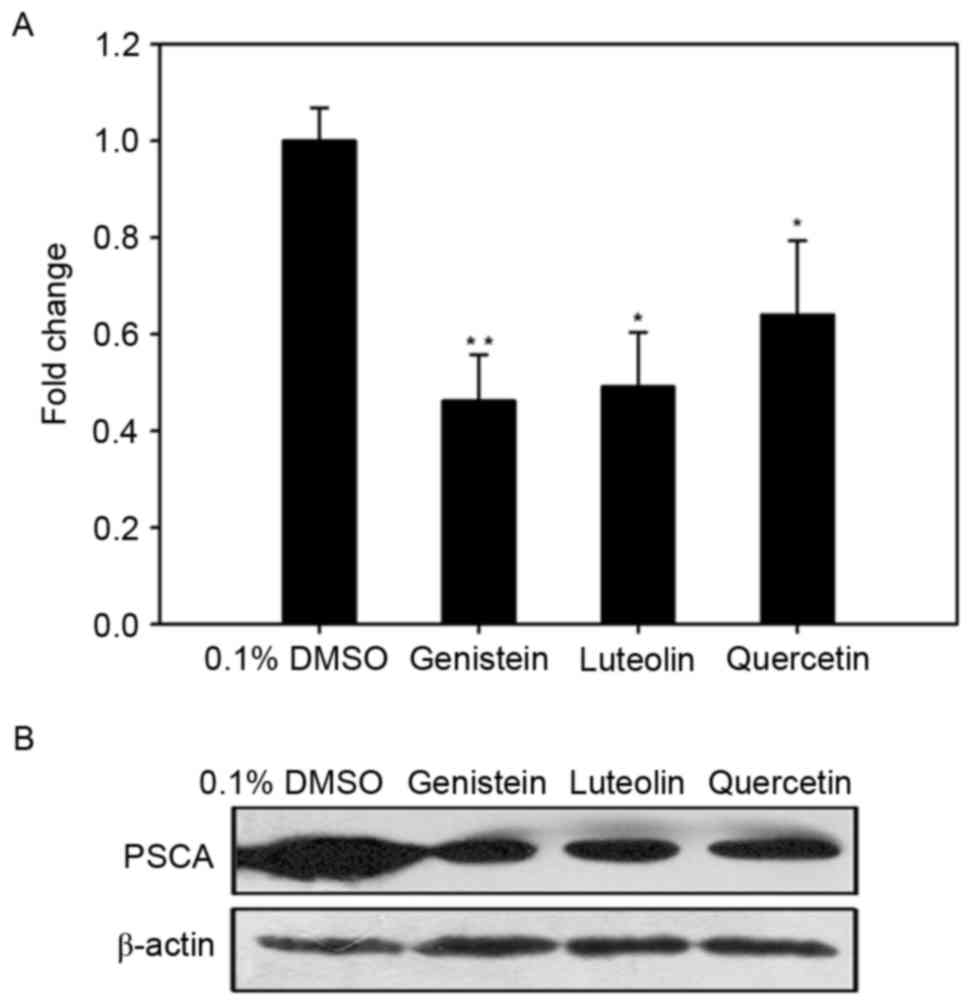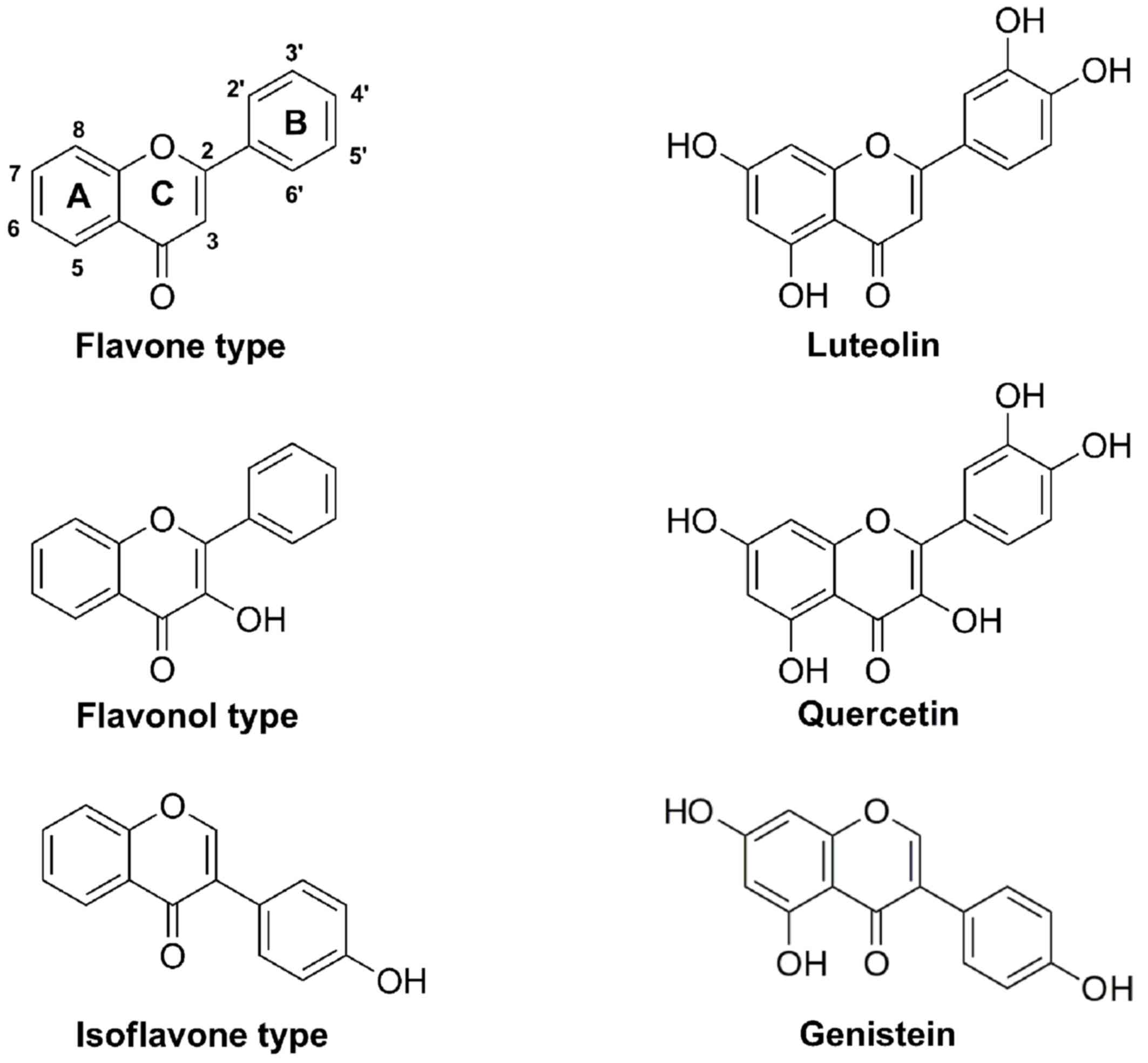|
1
|
Jemal A, Bray F, Center MM, Ferlay J, Ward
E and Forman D: Global cancer statistics. CA Cancer J Clin.
61:69–90. 2011. View Article : Google Scholar : PubMed/NCBI
|
|
2
|
Quinn M and Babb P: Patterns and trends in
prostate cancer incidence, survival, prevalence and mortality. Part
I: International comparisons. BJU Int. 90:162–173. 2002. View Article : Google Scholar : PubMed/NCBI
|
|
3
|
Pu YS, Chiang HS, Lin CC, Huang CY, Huang
KH and Chen J: Changing trends of prostate cancer in Asia. Aging
Male. 7:120–132. 2004. View Article : Google Scholar : PubMed/NCBI
|
|
4
|
Gu Z, Yamashiro J, Kono E and Reiter RE:
Anti-prostate stem cell antigen monoclonal antibody 1G8 induces
cell death in vitro and inhibits tumor growth in vivo via a
Fc-independent mechanism. Cancer Res. 65:9495–9500. 2005.
View Article : Google Scholar : PubMed/NCBI
|
|
5
|
Barve A, Jin W and Cheng K: Prostate
cancer relevant antigens and enzymes for targeted drug delivery. J
Control Release. 187:118–132. 2014. View Article : Google Scholar : PubMed/NCBI
|
|
6
|
Nejatollahi F, Abdi S and Asgharpour M:
Antiproliferative and apoptotic effects of a specific antiprostate
stem cell single chain antibody on human prostate cancer cells. J
Oncol. 2013:8398312013. View Article : Google Scholar : PubMed/NCBI
|
|
7
|
Antonarakis ES, Carducci MA, Eisenberger
MA, Denmeade SR, Slovin SF, Jelaca-Maxwell K, Vincent ME, Scher HI
and Morris MJ: Phase I rapid dose-escalation study of AGS-1C4D4, a
human anti-PSCA (prostate stem cell antigen) monoclonal antibody,
in patients with castration-resistant prostate cancer: A PCCTC
trial. Cancer Chemother Pharmacol. 69:763–771. 2012. View Article : Google Scholar : PubMed/NCBI
|
|
8
|
Saffran DC, Raitano AB, Hubert RS, Witte
ON, Reiter RE and Jakobovits A: Anti-PSCA mAbs inhibit tumor growth
and metastasis formation and prolong the survival of mice bearing
human prostate cancer xenografts. Proc Natl Acad Sci USA. 98:pp.
2658–2663. 2001; View Article : Google Scholar : PubMed/NCBI
|
|
9
|
Kang R, Zhao S, Liu L, Li F, Li E, Luo L,
Xu L, Wan S and Zhao Z: Knockdown of PSCA induces EMT and decreases
metastatic potentials of the human prostate cancer DU145 cells.
Cancer Cell Int. 16:202016. View Article : Google Scholar : PubMed/NCBI
|
|
10
|
Zhao Z, Ma W, Zeng G, Qi D, Ou L and Liang
Y: Small interference RNA-mediated silencing of prostate stem cell
antigen attenuates growth, reduces migration and invasion of human
prostate cancer PC-3M cells. Urol Oncol. 31:343–351. 2013.
View Article : Google Scholar : PubMed/NCBI
|
|
11
|
Livak KJ and Schmittgen TD: Analysis of
relative gene expression data using real-time quantitative PCR and
the 2(−Delta Delta C(T)) method. Methods. 25:402–408. 2001.
View Article : Google Scholar : PubMed/NCBI
|
|
12
|
Ravishankar D, Rajora AK, Greco F and
Osborn HM: Flavonoids as prospective compounds for anti-cancer
therapy. Int J Biochem Cell Biol. 45:2821–2831. 2013. View Article : Google Scholar : PubMed/NCBI
|
|
13
|
Harborne JB and Williams CA: Advances in
flavonoid research since 1992. Phytochemistry. 55:481–504. 2000.
View Article : Google Scholar : PubMed/NCBI
|
|
14
|
Ren W, Qiao Z, Wang H, Zhu L and Zhang L:
Flavonoids: Promising anticancer agents. Med Res Rev. 23:519–534.
2003. View Article : Google Scholar : PubMed/NCBI
|
|
15
|
Chiyomaru T, Yamamura S, Fukuhara S,
Yoshino H, Kinoshita T, Majid S, Saini S, Chang I, Tanaka Y,
Enokida H, et al: Genistein inhibits prostate cancer cell growth by
targeting miR-34a and oncogenic HOTAIR. PLoS One. 8:e703722013.
View Article : Google Scholar : PubMed/NCBI
|
|
16
|
Tsui KH, Chung LC, Feng TH, Chang PL and
Juang HH: Upregulation of prostate-derived Ets factor by luteolin
causes inhibition of cell proliferation and cell invasion in
prostate carcinoma cells. Int J Cancer. 130:2812–2823. 2012.
View Article : Google Scholar : PubMed/NCBI
|
|
17
|
Tsai PH, Cheng CH, Lin CY, Huang YT, Lee
LT, Kandaswami CC, Lin YC, Lee KP, Hung CC, Hwang JJ, et al:
Dietary flavonoids luteolin and quercetin suppressed cancer stem
cell properties and metastatic potential of isolated prostate
cancer cells. Anticancer Res. 36:6367–6380. 2016. View Article : Google Scholar : PubMed/NCBI
|
|
18
|
Schwartz GK and Shah MA: Targeting the
cell cycle: A new approach to cancer therapy. J Clin Oncol.
23:9408–9421. 2005. View Article : Google Scholar : PubMed/NCBI
|
|
19
|
Lee HZ, Leung HW, Lai MY and Wu CH:
Baicalein induced cell cycle arrest and apoptosis in human lung
squamous carcinoma CH27 cells. Anticancer Res. 25:959–964.
2005.PubMed/NCBI
|
|
20
|
Shenouda NS, Zhou C, Browning JD, Ansell
PJ, Sakla MS, Lubahn DB and Macdonald RS: Phytoestrogens in common
herbs regulate prostate cancer cell growth in vitro. Nutr Cancer.
49:200–208. 2004. View Article : Google Scholar : PubMed/NCBI
|
|
21
|
Knowles LM, Zigrossi DA, Tauber RA,
Hightower C and Milner JA: Flavonoids suppress androgen-independent
human prostate tumor proliferation. Nutr Cancer. 38:116–122. 2000.
View Article : Google Scholar : PubMed/NCBI
|
|
22
|
Zhang Z, Wang CZ, Du GJ, Qi LW, Calway T,
He TC, Du W and Yuan CS: Genistein induces G2/M cell cycle arrest
and apoptosis via ATM/p53-dependent pathway in human colon cancer
cells. Int J Oncol. 43:289–296. 2013.PubMed/NCBI
|
|
23
|
Markaverich BM, Vijjeswarapu M, Shoulars K
and Rodriguez M: Luteolin and gefitinib regulation of EGF signaling
pathway and cell cycle pathway genes in PC-3 human prostate cancer
cells. J Steroid Biochem Mol Biol. 122:219–231. 2010. View Article : Google Scholar : PubMed/NCBI
|
|
24
|
Liu KC, Yen CY, Wu RS, Yang JS, Lu HF, Lu
KW, Lo C, Chen HY, Tang NY, Wu CC and Chung JG: The roles of
endoplasmic reticulum stress and mitochondrial apoptotic signaling
pathway in quercetin-mediated cell death of human prostate cancer
PC-3 cells. Environ Toxicol. 29:428–439. 2014. View Article : Google Scholar : PubMed/NCBI
|
|
25
|
Neves MP, Cidade H, Pinto M, Silva AM,
Gales L, Damas AM, Lima RT, Vasconcelos MH and de São José
Nascimento M: Prenylated derivatives of baicalein and
3,7-dihydroxyflavone: Synthesis and study of their effects on tumor
cell lines growth, cell cycle and apoptosis. Eur J Med Chem.
46:2562–2574. 2011. View Article : Google Scholar : PubMed/NCBI
|
|
26
|
Ahmad N, Adhami VM, Afaq F, Feyes DK and
Mukhtar H: Resveratrol causes WAF-1/p21-mediated G(1)-phase arrest
of cell cycle and induction of apoptosis in human epidermoid
carcinoma A431 cells. Clin Cancer Res. 7:1466–1473. 2001.PubMed/NCBI
|
|
27
|
Calcabrini A, García-Martínez JM, González
L, Tendero MJ, Ortuño MT, Crateri P, Lopez-Rivas A, Arancia G,
González-Porqué P and Martín-Pérez J: Inhibition of proliferation
and induction of apoptosis in human breast cancer cells by lauryl
gallate. Carcinogenesis. 27:1699–1712. 2006. View Article : Google Scholar : PubMed/NCBI
|
|
28
|
Wang G, Song L, Wang H and Xing N:
Quercetin synergizes with 2-methoxyestradiol inhibiting cell growth
and inducing apoptosis in human prostate cancer cells. Oncol Rep.
30:357–363. 2013.PubMed/NCBI
|
|
29
|
Zhu QY, Hu R, Liu L, Yuan L, Huang WZ, Ma
L and Gu XJ: Quercetin induces the apoptosis of human PC-3 cells.
Zhonghua Nan Ke Xue. 17:790–793. 2011.(In Chinese). PubMed/NCBI
|
|
30
|
Senthilkumar K, Elumalai P, Arunkumar R,
Banudevi S, Gunadharini ND, Sharmila G, Selvakumar K and Arunakaran
J: Quercetin regulates insulin like growth factor signaling and
induces intrinsic and extrinsic pathway mediated apoptosis in
androgen independent prostate cancer cells (PC-3). Mol Cell
Biochem. 344:173–184. 2010. View Article : Google Scholar : PubMed/NCBI
|
|
31
|
Verma M and Srivastava S: New cancer
biomarkers deriving from NCI early detection research. Recent
Results Cancer Res. 163:72–84, 264-266. 2003. View Article : Google Scholar : PubMed/NCBI
|
|
32
|
Kelloff GJ, Bast RC Jr, Coffey DS, D'Amico
AV, Kerbel RS, Park JW, Ruddon RW, Rustin GJ, Schilsky RL, Sigman
CC and Woude GF Vande: Biomarkers, surrogate end points and the
acceleration of drug development for cancer prevention and
treatment: An update prologue. Clin Cancer Res. 10:3881–3884. 2004.
View Article : Google Scholar : PubMed/NCBI
|
|
33
|
Collins I and Workman P: New approaches to
molecular cancer therapeutics. Nat Chem Biol. 2:689–700. 2006.
View Article : Google Scholar : PubMed/NCBI
|
|
34
|
Kummar S, Gutierrez M, Doroshow JH and
Murgo AJ: Drug development in oncology: Classical cytotoxics and
molecularly targeted agents. Br J Clin Pharmacol. 62:15–26. 2006.
View Article : Google Scholar : PubMed/NCBI
|
|
35
|
Madu CO and Lu Y: Novel diagnostic
biomarkers for prostate cancer. J Cancer. 1:150–177. 2010.
View Article : Google Scholar : PubMed/NCBI
|
|
36
|
White RW deVere, Tsodikov A, Stapp EC,
Soares SE, Fujii H and Hackman RM: Effects of a high dose,
aglycone-rich soy extract on prostate-specific antigen and serum
isoflavone concentrations in men with localized prostate cancer.
Nutr Cancer. 62:1036–1043. 2010. View Article : Google Scholar : PubMed/NCBI
|
|
37
|
Adjakly M, Bosviel R, Rabiau N, Boiteux
JP, Bignon YJ, Guy L and Bernard-Gallon D: DNA methylation and soy
phytoestrogens: Quantitative study in DU-145 and PC-3 human
prostate cancer cell lines. Epigenomics. 3:795–803. 2011.
View Article : Google Scholar : PubMed/NCBI
|
|
38
|
Khan N, Bharali DJ, Adhami VM, Siddiqui
IA, Cui H, Shabana SM, Mousa SA and Mukhtar H: Oral administration
of naturally occurring chitosan-based nanoformulated green tea
polyphenol EGCG effectively inhibits prostate cancer cell growth in
a xenograft model. Carcinogenesis. 35:415–423. 2014. View Article : Google Scholar : PubMed/NCBI
|
|
39
|
Stettner M, Kaulfuss S, Burfeind P,
Schweyer S, Strauss A, Ringert RH and Thelen P: The relevance of
estrogen receptor-beta expression to the antiproliferative effects
observed with histone deacetylase inhibitors and phytoestrogens in
prostate cancer treatment. Mol Cancer Ther. 6:2626–2633. 2007.
View Article : Google Scholar : PubMed/NCBI
|
|
40
|
Ross S, Spencer SD, Holcomb I, Tan C,
Hongo J, Devaux B, Rangell L, Keller GA, Schow P, Steeves RM, et
al: Prostate stem cell antigen as therapy target: Tissue expression
and in vivo efficacy of an immunoconjugate. Cancer Res.
62:2546–2553. 2002.PubMed/NCBI
|
|
41
|
Dannull J, Diener PA, Prikler L,
Fürstenberger G, Cerny T, Schmid U, Ackermann DK and Groettrup M:
Prostate stem cell antigen is a promising candidate for
immunotherapy of advanced prostate cancer. Cancer Res.
60:5522–5528. 2000.PubMed/NCBI
|















